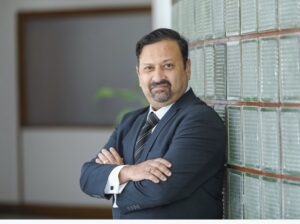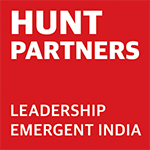Indranil ChoudhuryUTI Mutual Fund - Group CHRO

HR STRATEGY

1. HR drives the business, what is your take on this? How does it influence your HR strategy?
HR plays a vital role in the organisation’s short- and long-term goals. They are as responsible for the Company’s growth as any other critical function. There may be many tools and technologies deployed, but it is the organisation’s workforce that turns them into meaningful resources. And to build the human resource powerhouse, HRs need to attract, nurture, and retain the right talent.
When we hire employees, we do not just assess their domain knowledge or functional expertise but also evaluate how seamlessly they can adapt themselves into the Company’s values. Without cultural alignment, long-term success within the organization becomes challenging.
Another very important aspect from the organisation’s perspective is training and upskilling. Mapping the employees’ skills with the Company’s requirement, conducting training to bridge any gap is crucial to ensure that the talent pipeline remains relevant and is ready to step up the ladder when needed. A continuous learning drive gives an edge in the industry and plays an integral role in the organisation’s success. At UTI, upskilling is a critical part of our core strategy and helps us immensely in building the right talent.
Let’s be cognizant of the fact that HR is not an annual strategy, but a continuous process. When Companies develop their three-year or five-year strategies, a key consideration is whether their current talent is equipped to achieve those goals. HR plays a vital role in this by identifying the right people to deploy, hiring externally when necessary, and implementing practices to groom future leaders. Without strategic HR intervention, sustaining long-term business growth becomes incredibly challenging.
2. Do you think HR has succeeded in becoming a strategic partner for business? What could be the areas of improvement?
For HR to truly succeed as a strategic partner, it is essential to have a deep understanding of the business. HR professionals should approach their role with the mindset of learning the business first, rather than simply focusing on implementing HR concepts. The key is to align HR strategies with business needs, ensuring that HR initiatives support organizational goals rather than functioning in isolation.
TALENT MANAGEMENT

3. What is your recruitment and talent development strategy?
My talent strategy is quite different from conventional approaches. Broadly, talent hiring follows two key concepts: “Buy” and “Build”
- “Buy” refers to hiring experienced talent—senior and mid-level professionals—from the market.
- “Build” involves recruiting talent from Tier 1, Tier 2, and Tier 3 colleges and grooming them into future leaders within the organization.
A key focus for us has been building talent from the bottom of the pyramid. Over the last two to three years, we have hired around 200 people from various campuses. While we may have seen 20 to 30 percent attrition, many of these young minds brought fresh perspectives and innovative thinking into the organization. Additionally, many of those who have stayed are now being groomed for leadership roles.
In the financial services sector, there is often a tendency to hire talent from direct competitors. However, I strongly discourage this practice. Hiring from the competition often brings baggage and creates an artificial demand for certain professionals who move between similar organizations. Instead, I prefer to hire people from diverse backgrounds and train them through structured programs to help them adapt and succeed in the financial services industry.
4. In a VUCA world, how do you cope with the disruptive forces? Be it Talent Retention, Engagement, and Development.
Talent retention is a challenge across industries, whether in startups, traditional companies, or financial services, especially at the junior level, where attrition is high due to multiple opportunities. One key to retention is empowering employees. Young professionals, particularly those born after 1995, expect to be treated as responsible adults and included in decision-making processes. They seek continuous learning opportunities, open conversations with peers and leaders, and a flat hierarchy where logic and rationale matter more than authority.
To address this, we are actively coaching mid and senior management on how to engage and retain talent by fostering an inclusive, transparent, and development-focused work environment.
TECHNOLOGY AND ANALYTICS

5. How do you see AI/Technology/Digital & Analytics play a role in HR?
Every manual HR process should be automated. In fact, most of the HR functions, be it performance appraisals, training, or talent management, can leverage technology. Today, a wide range of affordable digital solutions exist beyond traditional platforms like IBM or SuccessFactors, making automation accessible to all organizations.
To ensure HR remains strategic rather than administrative, all operational and repetitive tasks should either be automated or outsourced. This allows HR teams to focus on value-driven initiatives rather than day-to-day execution.
Additionally, data and analytics play a critical role in HR. Organizations must ensure that high-quality data is available to derive deep insights into talent management and workforce trends, ultimately driving more informed decision-making.
6. What are your thoughts on workplace innovation in HR, particularly in the context of the current disruption/WFH we have been forced to adopt?
One of the biggest learnings in my career has come from working alongside peers and superiors in an office environment. The value of collaborative learning cannot be replaced.
My recommendation is to maintain flexibility at work timings while ensuring that employees do not feel isolated. A balance between remote work and in-person interactions is essential to foster engagement, learning, and workplace innovation.
ROLE OF HR IN THE ORGANISATION OF FUTURE

7. How has HR changed in recent past? What is the main challenge HR may face over the coming years?
HR has evolved significantly, shifting its focus towards succession planning, career paths, and digital training. Today, we are talking more about productivity and measuring the ROI of training programs than ever before.
One of the biggest challenges I see for HR in the coming years is managing Gen Z and the generations that follow. Their work styles and expectations are vastly different from previous generations, and we need to adapt quickly. A one-size-fits-all approach to workplace policies and benefits will not work anymore.
Flexibility is the key. For instance, rather than rigid leave structures, we should allow employees to allocate their time off based on their needs. Similarly, compensation structures should be adaptable, so employees can design their packages based on their priorities while still aligning with organization’s fundamental principles.
HR must act as a catalyst in this changing workplace dynamics where multiple generations work together. Striking a balance between organizational philosophy and employee flexibility will be critical to keeping teams engaged and ensuring long-term retention.
8. How do you define the Organization of today? And what is the future of the Organization?
The organization of today requires HR to wear multiple hats—acting as a recruiter, a trainer, a compensation and benefits specialist, and an administrator. But beyond these roles, HR must evolve into a true business partner, aligning talent strategies with organizational goals.
The future of organizations lies in this transformation where HR is no longer just a support function but a strategic driver of business success. We should move towards a model where HR is deeply integrated into decision-making, ensuring that people’s strategies directly contribute to growth, innovation, and sustainability. This shift is why HR should rightly be called Business HR or Business Partner HR.
PERSONAL

9. What message would you like to share with young professionals?
For young professionals entering HR, my biggest advice is to understand all the levels of business. Your success in HR depends on your ability to connect people’s strategies with business outcomes. If you don’t immerse yourself in the business, it will be challenging to make a meaningful impact.
Secondly, data is everything. As someone once said, “Data is the new oil,” but I believe data is the new HR. Every decision you make should be backed by data—without it, navigating the complexities of HR will be difficult. A strong foundation in data-driven decision-making will set you apart and help you drive real change in the organization.
10. What are the 3 most pivotal moments in your career that you have learned from and/or that got you where you are today?
The first defining moment in my career was working on a succession planning project early on, around 2002-2003. I had the opportunity to be trained by Saville and Holdsworth Limited and run assessment centers across the organization. This experience showed me the immense impact HR can have in shaping an organization’s future by identifying and developing the right talent. Seeing how people dynamics and individual competencies influence an organization, both positively and negatively, reinforced my belief in the power of HR.
The second pivotal moment came when I worked on transforming a performance management system. We moved from a subjective approach to a fully objective, data-driven performance management model. This shift had a tremendous impact, and the organization moved from 7th to 2nd rank just by making performance evaluations clearer, sharper, and more rewarding. It was a valuable lesson in how structured and transparent HR processes can directly influence business success.
The third key learning in my career has been my experience over the last five years—helping organization’s transition from traditional structures to more agile, future-ready models. Breaking down bureaucratic layers, streamlining decision-making, and creating a more responsive, adaptive culture have been challenging but incredibly rewarding. This transformation reinforced that HR is not just a function but a strategic business partner, instrumental in driving long-term organizational growth.
